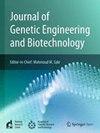Antiproliferative effect of ketogenic diet on hormone independent mammary gland carcinoma via harnessing glucose metabolism: In-vitro and In-vivo investigations
IF 2.8
Q3 Biochemistry, Genetics and Molecular Biology
Journal of Genetic Engineering and Biotechnology
Pub Date : 2025-03-23
DOI:10.1016/j.jgeb.2025.100480
引用次数: 0
Abstract
The ketogenic diet (KD) has been emphasized as a complementary strategy for management of several clinical conditions including cancer. Therefore, in this study we explored the effect of KD in mammary gland carcinoma through in-vitro and in-vivo studies. In-vitro studies were performed on MCF-7 and MDA-MB-231 cells with different experimental conditions such as high glucose (HG), low glucose (LG) and no glucose(NG) in conjugation with β-hydroxy butyrate(BHB) treatment. The MTT assay revealed that glucose deprivation alongwith BHB(10 mM) treatment significantly reduces the viability of MDA-MB-231 cells as compared to MCF-7 cells. Moreover, apoptotic and antiproliferative potential (via AO/EtBr, JC-1, cell migration assay) were analyzed on MDA-MB-231 cells which indicate that NG with BHB treatment induce cell death.Furthermore, we investigated the in-vivo anticancer efficacy against DMBA-induced mammary gland carcinoma in female Wistar rats. KD treatment effectively restored autonomic dysfunction, altered mammary gland morphology and histology; as evident through decrease in lobules, alveolar bud, restoration of the surface architecture and loss of tumor micro-vessels. The altered levels of antioxidants such as TBARs(0.85 ± 0.19 nM of MDA/µg of protein), SOD(2.26 ± 0.05 U/µg of protein), PC(41.36 ± 2.94 µM/µg of protein), GSH(10.58 ± 3.08 µM/µg of protein) were also restored after KD treatment. Overall findings suggested, that deprived glucose concentration alongwith BHB can impart antiproliferative and apoptotic effect as observed through MDA-MB-231cells. Moreover, KD also diminished the carcinogenic effects of DMBA in albino wistar rats. In view of above, the KD was utilised as adjuvant therapy in the management of mammary gland carcinoma,possibly by providing unfavourable microenvironment for highly proliferating tumour cells due deficiency of quickly available glucose.

生酮饮食通过利用葡萄糖代谢对激素不依赖型乳腺癌的抗增殖作用:体外和体内研究
生酮饮食(KD)已被强调为管理包括癌症在内的几种临床疾病的补充策略。因此,在本研究中,我们通过体外和体内研究来探讨KD在乳腺癌中的作用。采用高糖(HG)、低糖(LG)、无糖(NG)等不同实验条件对MCF-7和MDA-MB-231细胞进行β-羟基丁酸盐(BHB)偶联的体外实验研究。MTT实验显示,与MCF-7细胞相比,葡萄糖剥夺和BHB(10 mM)处理显著降低了MDA-MB-231细胞的活力。此外,通过AO/EtBr、JC-1、细胞迁移实验分析MDA-MB-231细胞的凋亡和抗增殖潜能,表明NG与BHB处理可诱导细胞死亡。此外,我们还研究了dmba诱导的雌性Wistar大鼠乳腺癌的体内抗癌作用。KD治疗可有效恢复自主神经功能障碍,改变乳腺形态学和组织学;通过小叶、肺泡芽的减少、表面结构的恢复和肿瘤微血管的丧失可见一斑。KD处理后,TBARs(0.85±0.19 nM的MDA/µg蛋白)、SOD(2.26±0.05 U/µg蛋白)、PC(41.36±2.94µM/µg蛋白)、GSH(10.58±3.08µM/µg蛋白)等抗氧化剂水平也有所恢复。我们通过mda - mb -231细胞观察到,葡萄糖浓度剥夺和BHB对细胞具有抗增殖和凋亡作用。此外,KD还能降低DMBA对白化wistar大鼠的致癌作用。综上所述,KD被用作乳腺癌的辅助治疗,可能是由于缺乏快速获得的葡萄糖,为高度增殖的肿瘤细胞提供了不利的微环境。
本文章由计算机程序翻译,如有差异,请以英文原文为准。
求助全文
约1分钟内获得全文
求助全文
来源期刊

Journal of Genetic Engineering and Biotechnology
Biochemistry, Genetics and Molecular Biology-Biotechnology
CiteScore
5.70
自引率
5.70%
发文量
159
审稿时长
16 weeks
期刊介绍:
Journal of genetic engineering and biotechnology is devoted to rapid publication of full-length research papers that leads to significant contribution in advancing knowledge in genetic engineering and biotechnology and provide novel perspectives in this research area. JGEB includes all major themes related to genetic engineering and recombinant DNA. The area of interest of JGEB includes but not restricted to: •Plant genetics •Animal genetics •Bacterial enzymes •Agricultural Biotechnology, •Biochemistry, •Biophysics, •Bioinformatics, •Environmental Biotechnology, •Industrial Biotechnology, •Microbial biotechnology, •Medical Biotechnology, •Bioenergy, Biosafety, •Biosecurity, •Bioethics, •GMOS, •Genomic, •Proteomic JGEB accepts
 求助内容:
求助内容: 应助结果提醒方式:
应助结果提醒方式:


